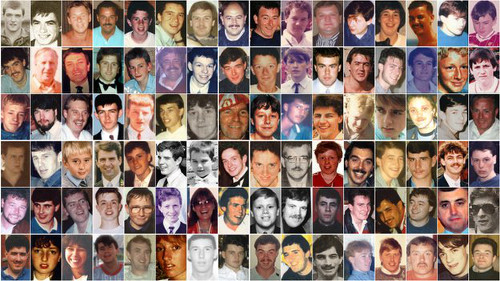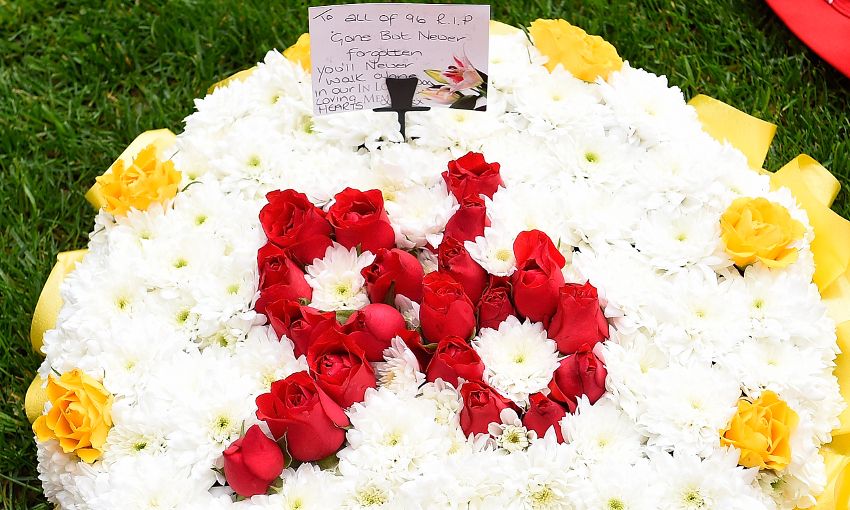Hillsborough inquests - April 5
The Hillsborough inquests commenced on March 31, 2014 and are the subject of reporting restrictions that have been imposed by the Attorney General's office. Liverpool Football Club is respectful of these restrictions and will therefore only be making available updates from other media channels for the duration of the inquest.

The report below - and the witness testimony contained within it - does not necessarily reflect the views of Liverpool FC. Please be aware that the reports on these pages will contain evidence about the day of the disaster which may be distressing.
To view archive reports from each day of the inquest hearings, click here.
Courtesy of the Liverpool Echo - April 5
The Hillsborough inquests were called off this afternoon on what had been due to be the final day of the coroner’s summing up.
Shadow Home Secretary Andy Burnham and Walton MP Steve Rotheram were among families at the court in Birchwood Park, Warrington, to see coroner Sir John Goldring sum up the case for a 25th day.
He had expected to conclude his summing up today before the jury retired to consider their decisions.
But, the jury did not come back into court after the morning session.
The court was adjourned due to an issue with one of the jurors and is expected to resume at 10am tomorrow (Wednesday).
In the morning Sir John reminded the jury of the 14 questions asked on a general questionnaire to establish by what means and in what circumstances the victims of the 1989 tragedy died.
The court heard one of the questions would ask the jury about the behaviour of Liverpool FC supporters at the FA Cup semi-final on April 15, 1989.
Question seven reads: “Was there any behaviour on the part of the football supporters which caused or contributed to the dangerous situation at the Leppings Lane turnstiles?”
Sir John said: “As I reminded you, it is a very controversial issue on which there was conflicting evidence.”
He added: “Was it the case that those outside the turnstiles behaved in a normal and reasonable way and that the dangerous situation developed purely because of insufficient turnstiles and a failure of police organisation?
“Or was it the case that some supporters behaved in an unruly or obstructive way and that made a significant contribution to the dangerous situation?
“Of course, behaviour by supporters which was normal and reasonable, rather than unruly, obstructive or non-compliant, cannot have contributed significantly to the dangerous situation.”
He told the seven women and three men on the jury they would need to weigh up evidence of fans, police officers, club staff, residents and others.
He said: “The AV evidence may help you considerably in forming a view about the behaviour of the supporters.
“As you know, the suggestion was made to many witnesses that it shows no unruly behaviour and no sign of heavy drinking, such as some police officers recounted.”
He also told them to bear in mind evidence of stadium safety expert John Cutlack, who assessed that the numbers of people who entered the stadium was consistent with the number of tickets sold.
The coroner said: “As I have told you repeatedly, nobody has suggested that there was any hooligan behaviour which contributed to this disaster.
“And there is no coherent evidence of supporters conspiring to force entry to the ground.”
He added: “There was no evidence from the AV material suggesting any misbehaviour by anyone who died, or indeed anyone who gave evidence.”
The jury was also reminded of some of the medical evidence about the 96.
Sir John said: “The medical experts who gave evidence said that the so-called 3.15pm cut-off which had been imposed in the original inquests was arbitrary and wrong.
“That cut-off, you will remember, was based on an understanding that all of those who died were either dead or had suffered such severe brain injury by that time that it would inevitably prove to be fatal, whatever the nature of the response.
“The experts who gave evidence to you said that was a wrong general approach.
“It was based on a misunderstanding.
“One of the topics which you will have to consider in connection (..) is whether some of those who died would or might have been saved if the emergency response had been delivered more quickly or had been better organised.”



